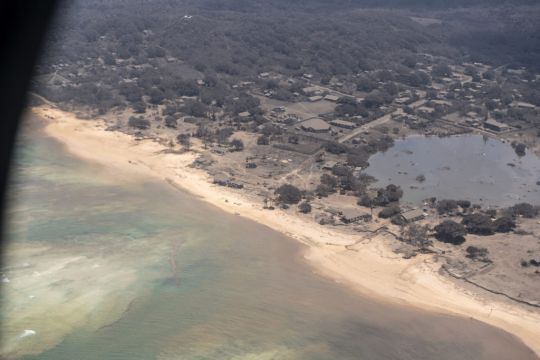Tonga appears to have avoided the widespread devastation that many initially feared would follow last week’s violent undersea volcanic eruption.
In its first update since the eruption, the government on Tuesday confirmed three deaths — two local residents and a British woman.
Concerns remain over the fate of people on some of the hard-hit smaller islands, where many houses were destroyed. Communications have been down everywhere, making assessments more difficult.
But on Tonga’s main island of Tongatapu, perhaps the biggest problem is the ash that has transformed it into a grey moonscape, contaminating the rainwater that people rely on to drink.

New Zealand’s military is sending fresh water and other much-needed supplies, but said on Tuesday the ash covering Tonga’s main runway will delay the flight at least another day.
On Tongatapu, at least, life is slowly returning to normal. The tsunami that swept over coastal areas after the eruption was frightening for many but rose only about 80 centimetres (2.7 feet), allowing most to escape.
“We did hold grave fears, given the magnitude of what we saw in that unprecedented blast,” said Katie Greenwood, the head of delegation in the Pacific for the International Federation of Red Cross and Red Crescent Societies.
“Fortunately, in those major population centres we are not seeing the catastrophic effect we thought might happen, and that’s very good news.”
Ms Greenwood, who is based in Fiji and has been talking with people in Tonga by satellite phone, said an estimated 50 homes were destroyed on Tongatapu but that nobody needed to use emergency shelters. She said about 90 people on the nearby island of ‘Eua were using shelters.
UN humanitarian officials and Tonga’s government reported significant infrastructural damage around Tongatapu and concerns about the lack of contact from some of the low-lying islands.
The Geneva-based UN World Health Organisation reported that many people remained unaccounted for.
New Zealand’s High Commission in Tonga also reported significant damage along the western coast of Tongatapu, including to resorts and the waterfront area.

Tonga’s government said all the homes on Mango island — where about 36 people live — were destroyed and only two houses remained standing on Fonoifua island, home to about 69 people.
The government described the event as an “unprecedented disaster” and said tsunami waves had risen as high as 15 metres (49 feet) in places.
Ms Greenwood said Tonga does not want an influx of aid workers following the eruption as Tonga is one of the few remaining places in the world that has managed to avoid any outbreaks of the coronavirus.
Officials fear that if outsiders bring in the virus it could create a much bigger disaster than the one Tongans are already facing.
Another worry, said Ms Greenwood, is that the volcano could erupt again. She said there is currently no working equipment around it which could help predict such an event.
Satellite images captured the spectacular eruption of the Hunga Tonga Hunga Ha’apai volcano on Saturday, with a plume of ash, steam and gas rising like a giant mushroom above the South Pacific.
The volcano is located about 64 kilometres (40 miles) north of Tonga’s capital, Nuku’alofa.
Two people drowned in Peru, which also reported an oil spill after waves moved a ship that was transferring oil at a refinery.

New Zealand’s military said it hoped the airfield in Tonga would be opened either Wednesday or Thursday.
The country also sent two navy ships to Tonga on Tuesday and pledged an initial 1 million New Zealand dollars (£500,000) toward recovery efforts.
Australia sent a navy ship from Sydney to Brisbane to prepare for a support mission if needed.
Chinese Foreign Ministry spokesperson Zhao Lijian on Tuesday said China is preparing to send drinking water, food, personal protective equipment and other supplies to Tonga as soon as flights resume.
The UN World Food Program is exploring how to bring in relief supplies and more staff and has received a request to restore communication lines in Tonga, which is home to about 105,000 people, UN spokesman Stephane Dujarric said.
Communications with the island nation are limited because the single underwater fibre-optic cable that connects Tonga to the rest of the world was likely severed in the eruption. The company that owns the cable said the repairs could take weeks.







